|
|
|
Sort Order |
|
|
|
Items / Page
|
|
|
|
|
|
|
| Srl | Item |
| 1 |
ID:
030025
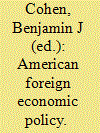

|
|
|
|
|
| Publication |
New York, Harper & Row Publishers, 1968.
|
| Description |
xii, 442p.
|
|
|
|
|
|
|
|
|
|
|
|
Copies: C:1/I:0,R:0,Q:0
Circulation
| Accession# | Call# | Current Location | Status | Policy | Location |
| 002137 | 327.73/COH 002137 | Main | On Shelf | General | |
|
|
|
|
| 2 |
ID:
099123
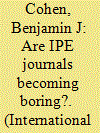

|
|
|
| 3 |
ID:
040574
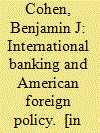

|
|
|
|
|
| Publication |
London, Yale University Press., 1986.
|
| Description |
xi,347p.
|
| Standard Number |
0300036140
|
|
|
|
|
|
|
|
|
|
|
|
Copies: C:1/I:0,R:0,Q:0
Circulation
| Accession# | Call# | Current Location | Status | Policy | Location |
| 027252 | 332.15/COH 027252 | Main | On Shelf | General | |
|
|
|
|
| 4 |
ID:
081741
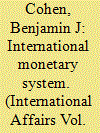

|
|
|
|
|
| Publication |
2008.
|
| Summary/Abstract |
This article examines the dynamics of power and rule-setting in the international monetary system. It begins with a brief discussion of the meaning of power in international monetary relations, distinguishing between two critical dimensions of monetary power: autonomy and influence. Major developments have led to a greater diffusion of power in monetary affairs, both among states and between states and societal actors. But the diffusion of power has mainly been in the dimension of autonomy, rather than influence, meaning that leadership in the system has been dispersed rather than relocated-a pattern of change in the geopolitics of finance that might be called leaierless diffusion. The pattern of leaderless diffusion, in turn, is generating greater ambiguity in prevailing governance structures. Rule-setting in monetary relations increasingly relies not on negotiations among a few powerful states but, rather, on the evolution of custom and usage among growing numbers of autonomous agents. Impacts on governance structures can be seen on two levels: the individual state and the global system. At the state level, the dispersion of power compels governments to rethink their commitment to national monetary sovereignty. At the systemic level, it compounds the difficulties of bargaining on monetary issues. More and more, formal rules are being superseded by informal norms that emerge, like common law, not from legislation or statutes but from everyday conduct and social convention.
|
|
|
|
|
|
|
|
|
|
|
|
|
|
|
|
| 5 |
ID:
066581
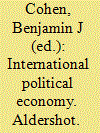

|
|
|
|
|
| Publication |
Aldershot, Ashgate Publishing Limited, 2005.
|
| Description |
xxii, 601p.
|
| Series |
The library of essays in international relations
|
| Standard Number |
0754624668
|
|
|
|
|
|
|
|
|
|
|
|
Copies: C:1/I:0,R:0,Q:0
Circulation
| Accession# | Call# | Current Location | Status | Policy | Location |
| 050355 | 337/COH 050355 | Main | On Shelf | General | |
|
|
|
|
| 6 |
ID:
085704
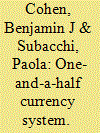

|
|
|
| 7 |
ID:
091628
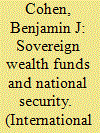

|
|
|
|
|
| Publication |
2009.
|
| Summary/Abstract |
One of the most striking financial developments in recent years is the emergence of sovereign wealth funds (SWFs)-large publicly owned investment portfolios, which are growing rapidly in both number and size. In a global environment already roiled by a prolonged credit crisis, SWFs raise tricky and potentially controversial new questions for international financial regulation. One issue of concern to many in host countries is the possibility that some SWFs might be used for overt or tacit political purposes, posing a challenge for global monetary governance: a Great Tradeoff between the world community's collective interest in sustaining the openness of capital markets and the legitimate national security concerns of individual host countries. Can some balance between the two be found that will be both stable and acceptable to all concerned? Individually as well as collectively, recipient countries have begun to address the regulatory challenge directly. To date, however, accomplishments have been slight and have failed to stem a noticeable drift towards financial protectionism. A review of some recent proposals suggests that there is no foolproof solution to the Great Tradeoff. But the potential for controversy could be significantly reduced by a negotiated agreement among host governments addressing three key issues: definitions, risk assessment and dispute resolution. The most logical venue for such an exercise would be the OECD, building on its already extensive experience with international investment issues.
|
|
|
|
|
|
|
|
|
|
|
|
|
|
|
|
| 8 |
ID:
073096
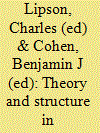

|
|
|
|
|
| Publication |
Cambridge, MIT Press, 1999.
|
| Description |
426p.
|
| Standard Number |
0262621274
|
|
|
|
|
|
|
|
|
|
|
|
Copies: C:1/I:0,R:0,Q:0
Circulation
| Accession# | Call# | Current Location | Status | Policy | Location |
| 042616 | 337/LIP 042616 | Main | On Shelf | General | |
|
|
|
|
|
|
|
|
|